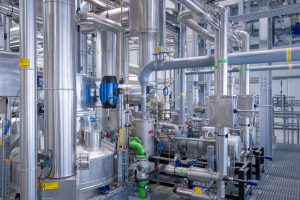
The 90 employees of APK AG might not manufacture gold in Merseburg, but thanks to their innovative process, they can recycle plastic film packaging so well that the plastics to be created are practically as good as new. The demand is there – and the new production facilities are currently under construction in the Chemical Triangle in southern Saxony-Anhalt.
Materials loops are in development
Mixed plastic waste will soon be delivered to APK Merseburg by the tonne. Type-pure plastics will leave the plant. Years of research work is behind this transformation, which has succeeded in separating the different types of plastics that are used for packaging of sausage and cheese, for example.
The Merseburg-based company has succeeded in separating these substances with the help of a multi-stage solvent-based process so that polyethylene and polyamide, for example, can be obtained in an almost pure form with few residues; under the names of Mersalen and Mersamid – the names having been chosen in reference to the location of Merseburg – the plastics are now on the market.
Newcycling is the name of the process that makes use of the material cycles. In this con-text, the solvent is purified and reused in a continuous cycle, explains Florian Riedl. APK’s Head of Business Development for Newcycling continues: “The regranulate from the newcycling process can be reused in sophisticated applications, such as flexible packaging, and in this way, replace newly manufactured plastics.” Conserving resources through materials recycling.
APK has not yet received the ultimate accolade of approval for the food industry. Yet the demand from the world of industry for high quality granules is exceptionally high at both the domestic and international levels. For Mersalen (LDPE), brand owners and packaging manufacturers are the key customers. The firm wraps detergents and cleaning products, for example. “As very few LDPE regranulates are currently used in flexible packaging, we are tapping into a new market,” explains Florian Riedl. Mersamid (PA) mainly sees use in technical applications.
A new challenge: plastic from households
APK developed newcycling simultaneously to its traditional, automated recycling of plastic waste. Right now, its first commercial newcycling plant is under construction in Merseburg. It will have a capacity of 8,000 tonnes per year and is set to be operational by the end of 2018. The opening of the new plant will see the company team increase to 120 employees. APK also provides its own staff training to ensure that it is able to draw on a sufficient number of specialists. After all, APK wants to continue growing. An investment in a second plant which will process household waste and have a capacity of at least 25,000 tonnes per year has already been confirmed and is set to be ready for operations by the end of 2020. To date, it is only industrial companies that have supplied the plastic waste.
Household waste would pose a particular challenge, explains Florian Riedl, as it mostly tends to be highly mixed. A type-pure separation of the differing types of plastic with the use of modern sorting facilities isn’t economical. In this respect, the small-format films of various types of plastic are combined to create a mixed residual fraction. To date, mixtures of this kind have usually ended up at waste incineration plants, or are processed into regranulates which can only be used for low-quality applications such as park benches. “With the newcycling process, it is even possible for these mixed fractions to be reconditioned to a high quality,” explains Florian Riedl, describing the level of quality that the Merseburg-based business is able to offer.
The market is demanding high-quality regranulate
With the planned plant, the company will help to fulfil the new and demanding statutory quotas for the material recycling of packaging waste from households. Within three years, the quota is set to be increased from the current one third to 63 percent. It is to be expected that the quota will be increased further, not least due to EU requirements. With more than three million tonnes of plastic packaging per year in Germany alone, the planned capacity in Merseburg is therefore just a start.
The plans for expansion don’t just have a firm footing due to the statutory requirements, however: the market for higher quality regranulates is also growing all the time. Both brand owners and packaging manufacturers have set themselves the target of massively increasing their proportions of regranulate. So that they can achieve this, above all else, high-quality regranulates are required, explains Florian Riedl. Therefore, innovative recycling methods are necessary which can produce high-quality products from inferior waste streams – such as newcycling from Central Germany.
When it attended the Fakuma trade fair at the joint stand for Saxony-Anhalt last year, newcycling proved able to convince suppliers and customers that it keeps what its developers promise. From 16 until 22 October, APK AG will again be attending this leading international trade fair for plastics processing in Friedrichshafen, where it can be found at the stand for Saxony-Anhalt, FO-38.

